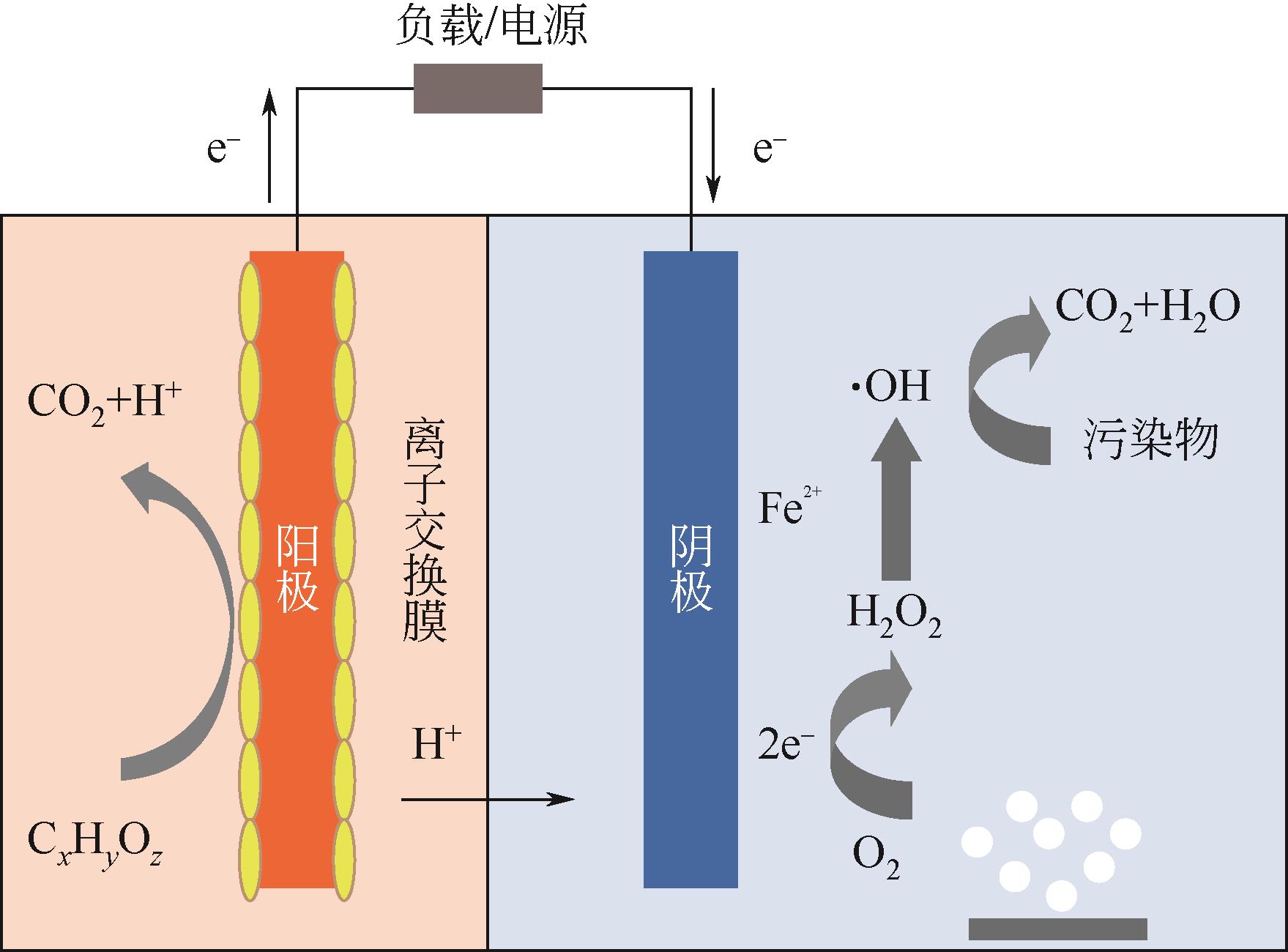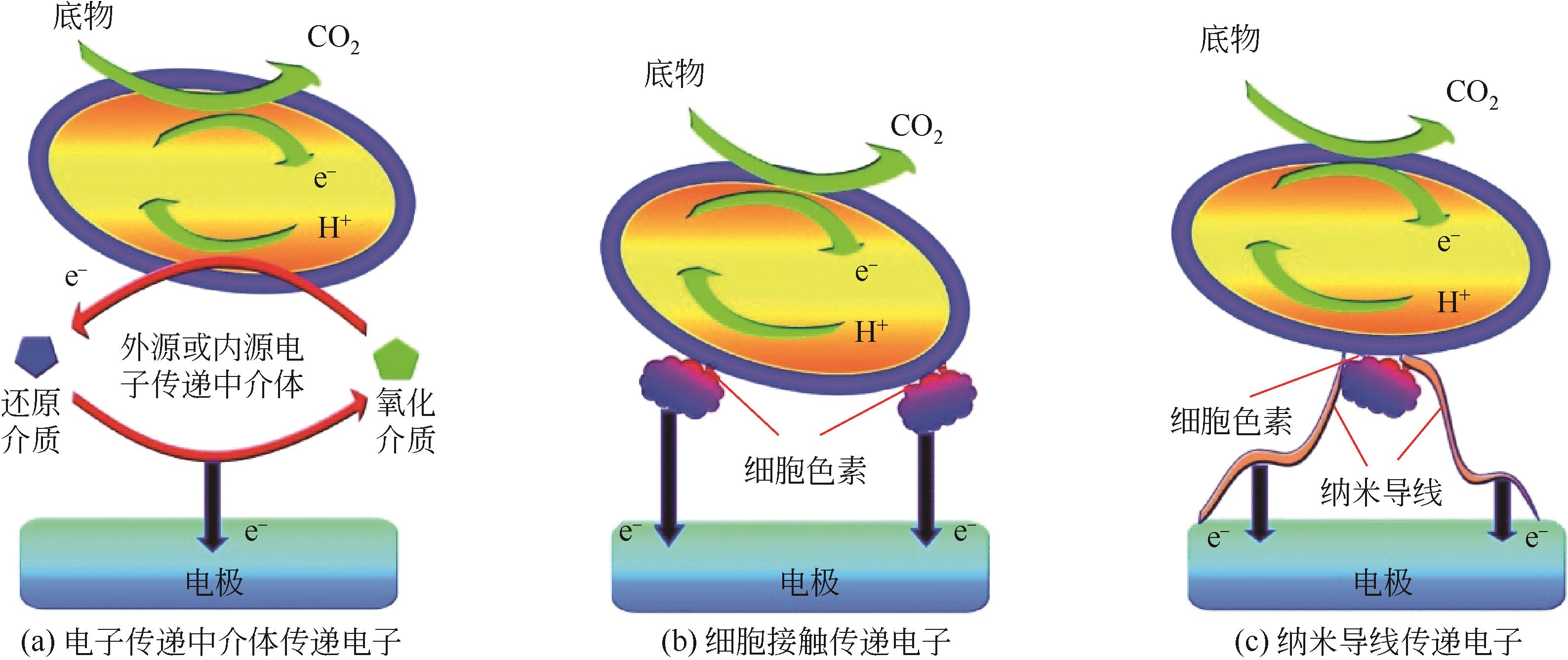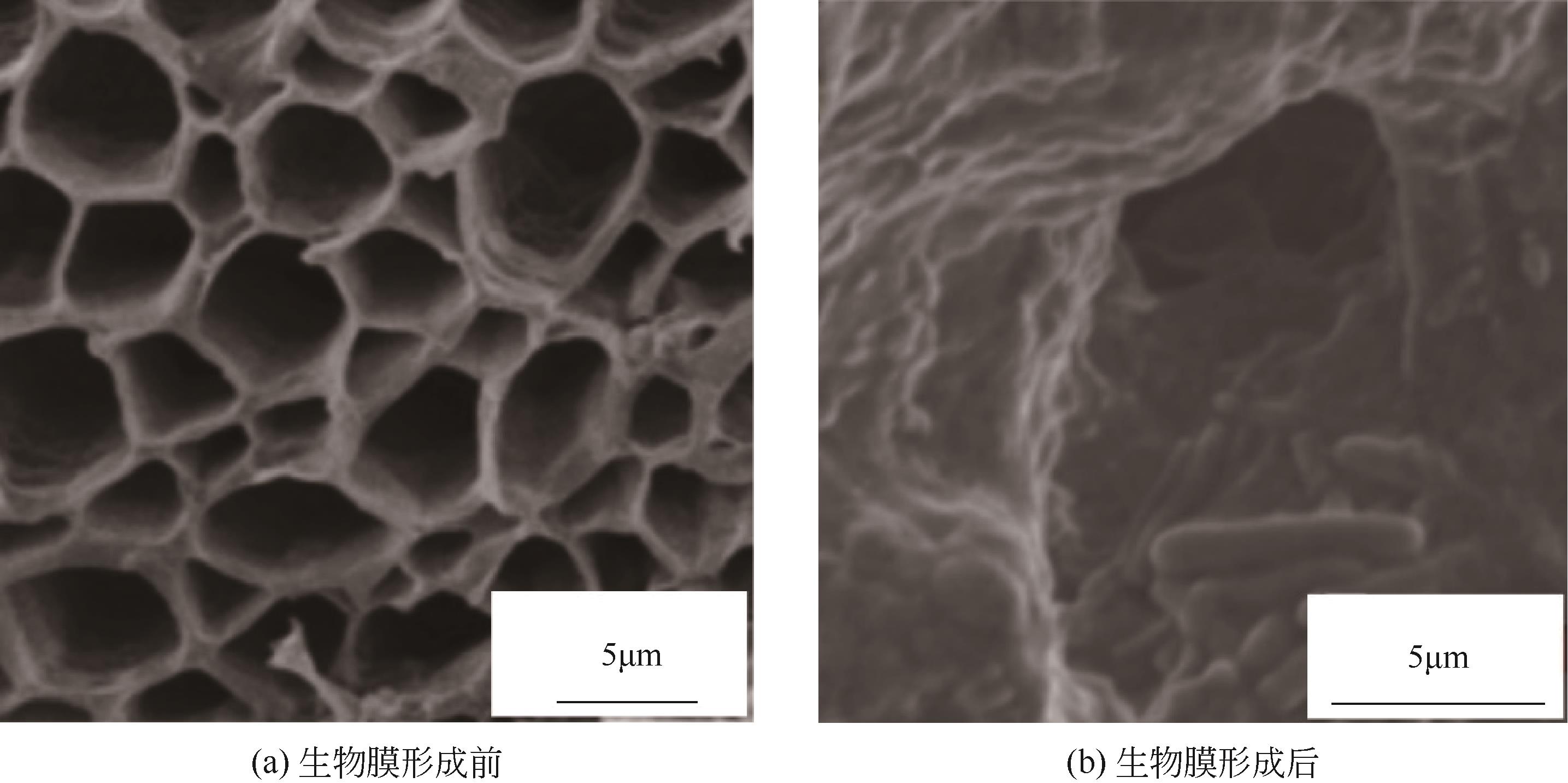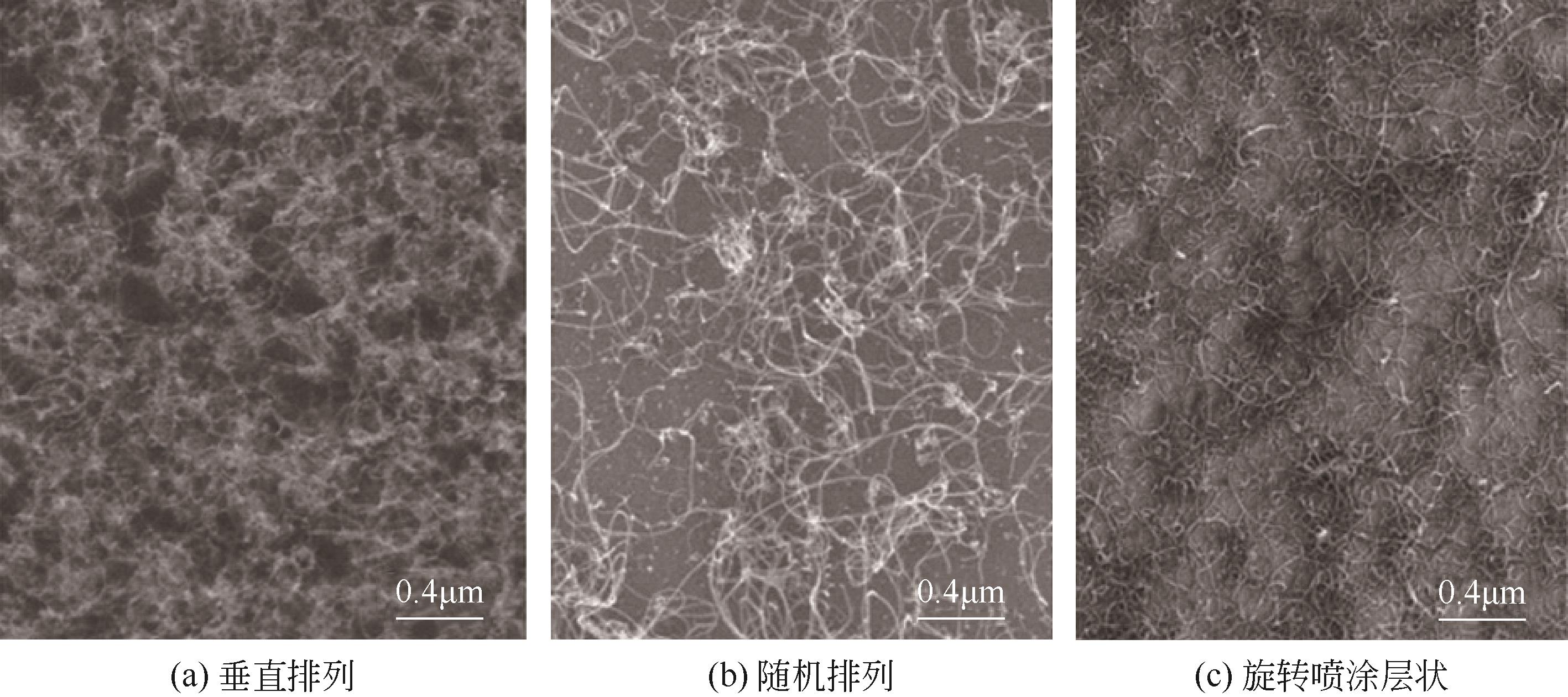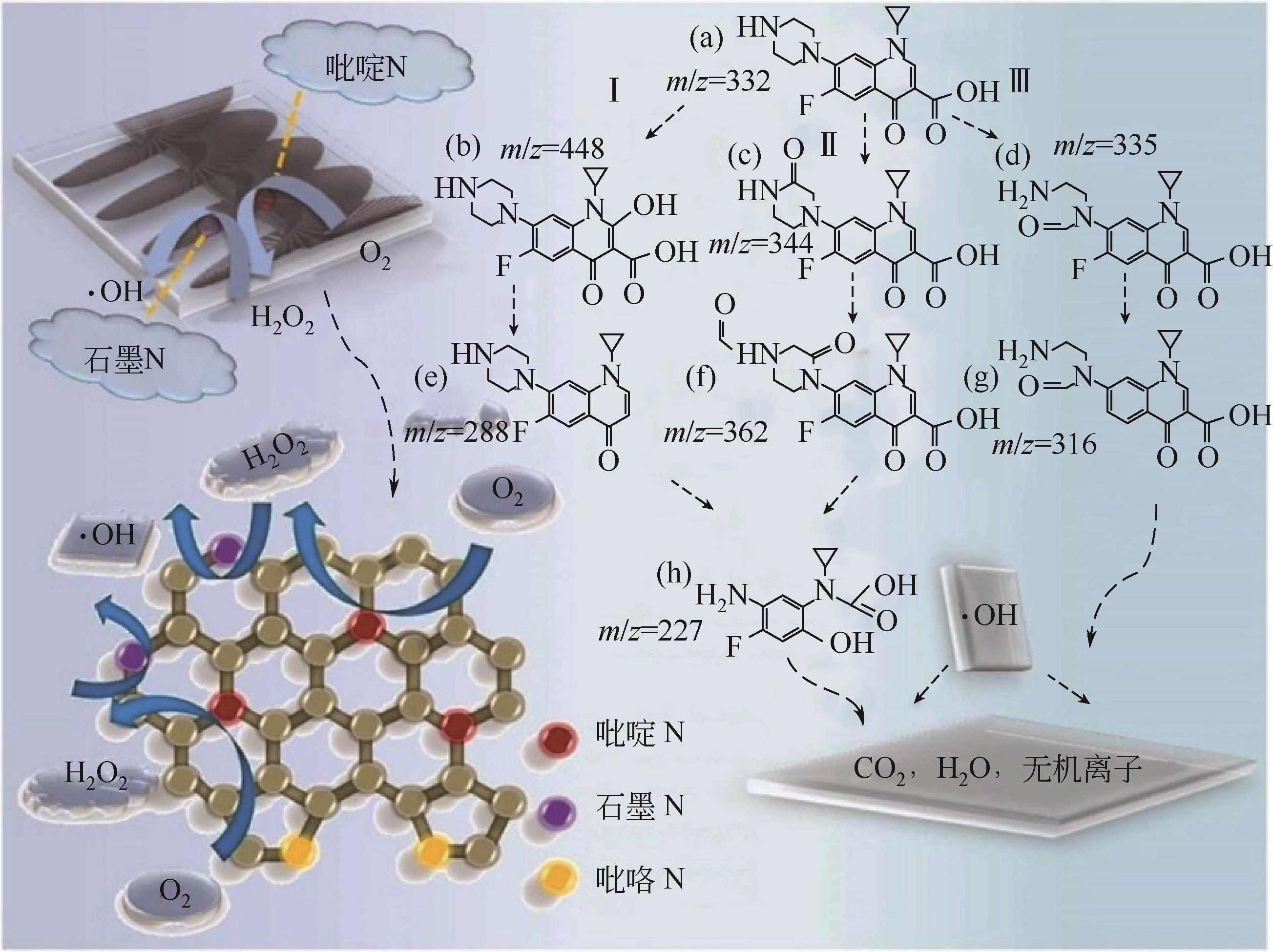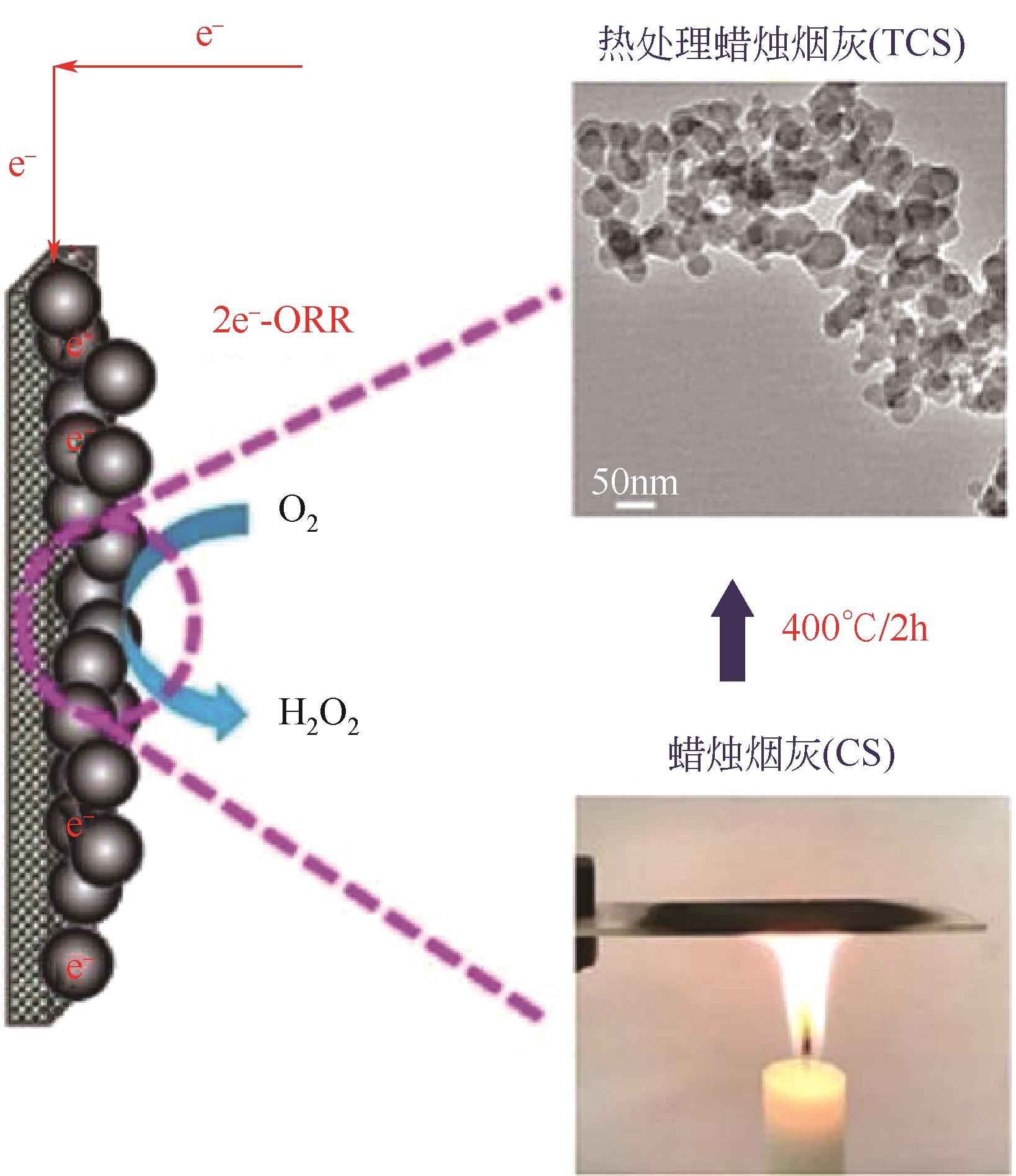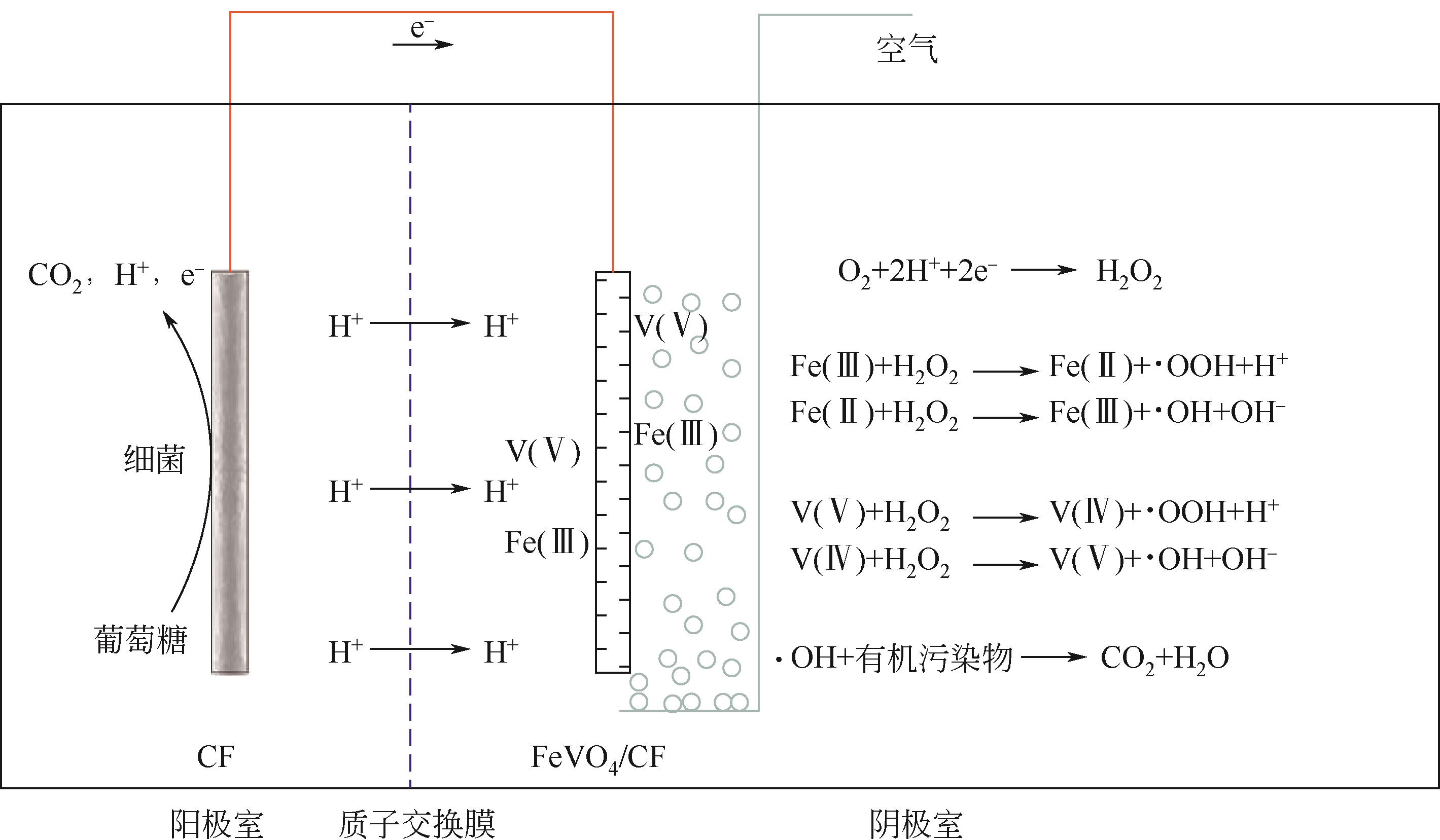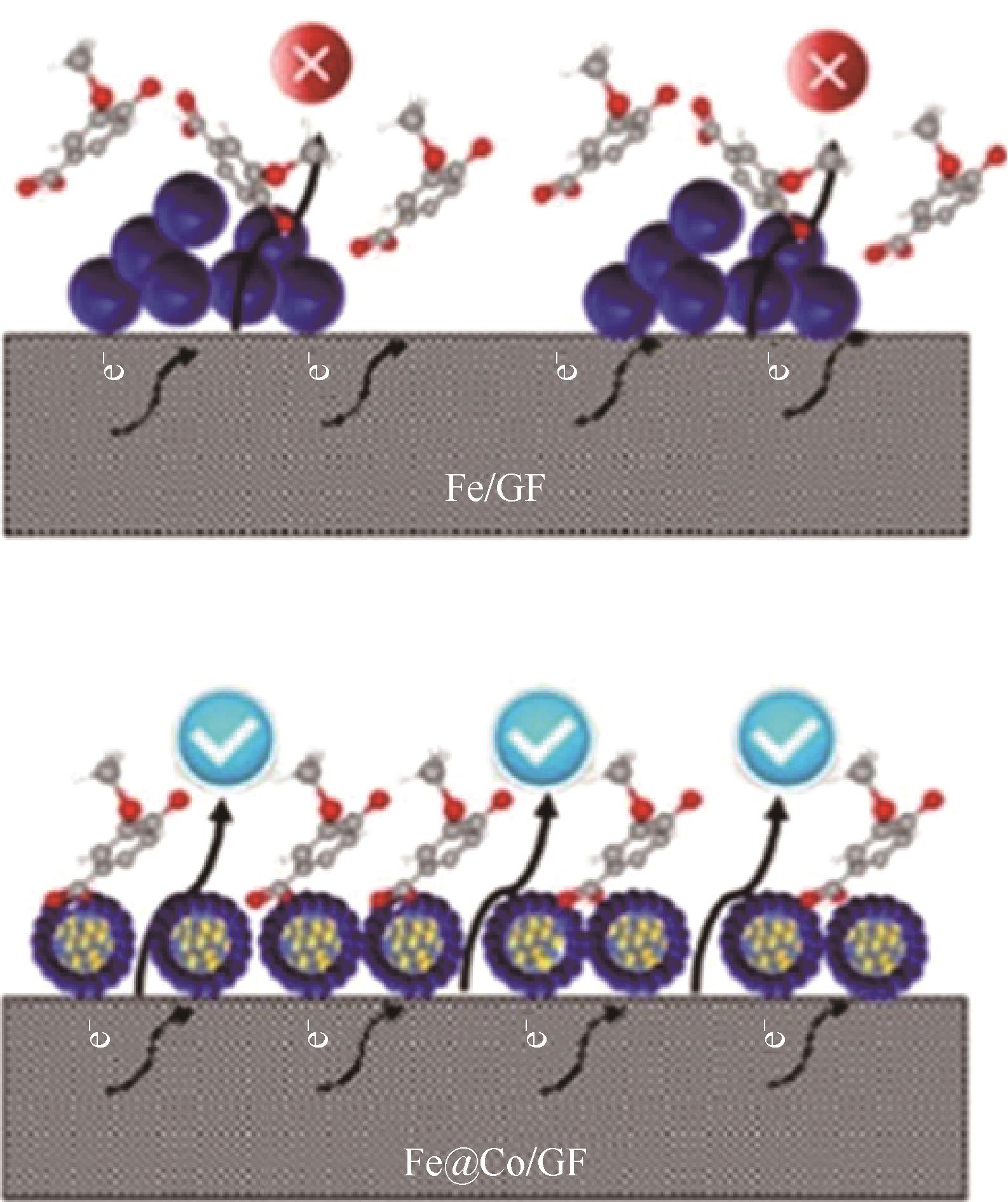Chemical Industry and Engineering Progress ›› 2023, Vol. 42 ›› Issue (11): 5929-5942.DOI: 10.16085/j.issn.1000-6613.2022-2314
• Resources and environmental engineering • Previous Articles
Treatment of wastewater by bio-electro-Fenton system: a review
WU Shiyu( ), DU Zhiping(
), DU Zhiping( ), SHEN Jing, LI Jianfeng, CHENG Fangqin(
), SHEN Jing, LI Jianfeng, CHENG Fangqin( ), ZHAO Huazhang
), ZHAO Huazhang
- Shanxi Laboratory for Yellow River, Institute of Resources and Environmental Engineering, Shanxi University, Taiyuan 030006, Shanxi, China
-
Received:2022-12-14Revised:2023-01-25Online:2023-12-15Published:2023-11-20 -
Contact:DU Zhiping, CHENG Fangqin
生物电芬顿系统在废水处理中的研究进展
武诗宇( ), 杜志平(
), 杜志平( ), 申婧, 李剑锋, 程芳琴(
), 申婧, 李剑锋, 程芳琴( ), 赵华章
), 赵华章
- 山西大学资源与环境工程研究所,山西省黄河实验室,山西 太原 030006
-
通讯作者:杜志平,程芳琴 -
作者简介:武诗宇(1994—),男,博士研究生,研究方向为生物电化学水处理技术。E-mail:wushiyu126@126.com。 -
基金资助:国家自然科学基金(22272098);山西省重点研发计划(202102090301028);中央引导地方科技发展专项资金项目(YDZX20191400002539);山西省高等学校科技创新项目
CLC Number:
Cite this article
WU Shiyu, DU Zhiping, SHEN Jing, LI Jianfeng, CHENG Fangqin, ZHAO Huazhang. Treatment of wastewater by bio-electro-Fenton system: a review[J]. Chemical Industry and Engineering Progress, 2023, 42(11): 5929-5942.
武诗宇, 杜志平, 申婧, 李剑锋, 程芳琴, 赵华章. 生物电芬顿系统在废水处理中的研究进展[J]. 化工进展, 2023, 42(11): 5929-5942.
share this article
Add to citation manager EndNote|Ris|BibTeX
URL: https://hgjz.cip.com.cn/EN/10.16085/j.issn.1000-6613.2022-2314
| 微生物 | 门 | 种 | 电子传递机质 | 参考文献 |
|---|---|---|---|---|
| 细菌 | 变形菌门 | 沼泽红假单胞菌 | 细胞接触传递 | [ |
| 嗜酸性氧化亚铁硫杆菌 | 细胞接触传递 | [ | ||
| 大肠埃希菌 | 电子传递中介体传递 | [ | ||
| 铜绿假单胞菌 | 电子传递中介体传递 | [ | ||
| 运动发酵单胞菌 | 细胞接触传递、电子传递中介体传递 | [ | ||
| 希瓦氏菌 | 细胞接触传递、纳米导线传递、电子传递中介体传递 | [ | ||
| 硫还原地杆菌 | 细胞接触传递、纳米导线传递 | [ | ||
| 厚壁菌门 | 丁酸梭菌 | 细胞接触传递 | [ | |
| 真菌 | 子囊菌门 | 异常汉逊酵母 | 细胞接触传递 | [ |
| 酿酒酵母菌 | 细胞接触传递、电子传递中介体传递 | [ | ||
| 古菌 | 广古菌门 | 产甲烷菌 | 细胞接触传递、纳米导线传递 | [ |
| 微生物 | 门 | 种 | 电子传递机质 | 参考文献 |
|---|---|---|---|---|
| 细菌 | 变形菌门 | 沼泽红假单胞菌 | 细胞接触传递 | [ |
| 嗜酸性氧化亚铁硫杆菌 | 细胞接触传递 | [ | ||
| 大肠埃希菌 | 电子传递中介体传递 | [ | ||
| 铜绿假单胞菌 | 电子传递中介体传递 | [ | ||
| 运动发酵单胞菌 | 细胞接触传递、电子传递中介体传递 | [ | ||
| 希瓦氏菌 | 细胞接触传递、纳米导线传递、电子传递中介体传递 | [ | ||
| 硫还原地杆菌 | 细胞接触传递、纳米导线传递 | [ | ||
| 厚壁菌门 | 丁酸梭菌 | 细胞接触传递 | [ | |
| 真菌 | 子囊菌门 | 异常汉逊酵母 | 细胞接触传递 | [ |
| 酿酒酵母菌 | 细胞接触传递、电子传递中介体传递 | [ | ||
| 古菌 | 广古菌门 | 产甲烷菌 | 细胞接触传递、纳米导线传递 | [ |
| 废水类型 | 阳极 | 阴极 | 催化剂 | 运行条件 | 污染物浓度 | 去除率 | 参考 文献 |
|---|---|---|---|---|---|---|---|
| 染料废水 | |||||||
| 橙黄Ⅱ | 碳毡 | PPy/AQDS/碳毡 | γ-FeOOH | pH=7,外部电阻1000Ω,曝气量100mL/min,γ-FeOOH 1g/L | 0.2mmol/L | 100% | [ |
| 橙黄Ⅱ | 碳毡 | 碳纳米管/ γ-FeOOH | pH=7,外部电阻1000Ω | 0.1mmol/L | 100% | [ | |
| 甲基橙 | 碳纸+ 颗粒活性炭 | 负载Pt碳纸+ 颗粒活性炭 | FeSO4·7H2O | pH=3,外部电阻1000Ω,曝气量150mL/min,FeSO4·7H2O 0.05mol/L | 300mg/L | 86.39% | [ |
| 甲基橙 | 石墨纤维刷 | Fe2O3/活性碳毡 | pH=3,外部电阻100Ω,曝气量750mL/min | 5mg/L | 86.7% | [ | |
| 罗丹明B | 活性碳毡 | Fe@Fe2O3/ 活性碳毡 | pH=3,外部电阻120Ω,曝气量300mL/min | 10mg/L | 95.0% | [ | |
| 橙G | 碳刷 | 石墨板 | Fe2+ | pH=2,外部电阻10Ω,曝气量8mL/min,Fe2+ 0.01mol/L | 400mg/L | 99.6% | [ |
| 酸性橙7 | 碳布 | 碳毡 | FeVO4 | pH=3,外部电阻1000Ω,FeVO4 12.5g/L | 50mg/L | 89% | [ |
酸性绿50 结晶紫 | 石墨棒 | 石墨棒 | 铁藻酸盐微珠 | pH=2,外部电阻1000Ω,曝气量2L/min,铁藻酸盐微珠10g(铁浓度150mg/L) | 10mg/L | 94% 83% | [ |
| 亚甲基蓝 | 碳刷 | 石墨板 | Fe2+ | pH=3,外部电阻5Ω,曝气量10mL/min,Fe2+ 2mmol/L | 50mg/L | 100% | [ |
| 亚甲基蓝 | 碳刷 | 石墨板 | Fe2+ | pH=2,外加电压0.4V,曝气量350mL/min,Fe2+ 0.2mmol/L | 20mg/L | 99% | [ |
| 橙G | 100% | ||||||
| 甲苯胺蓝 | 98% | ||||||
| 麦尔多拉蓝 | 99% | ||||||
| 罗丹明B | 100% | ||||||
| 罗丹明6G | 100% | ||||||
| 雷马素蓝RR | 葡萄糖氧化酶 固定化碳毡 | 碳毡 | FeSO4·7H2O | pH=3.5,外部电阻10Ω,FeSO4·7H2O 1.5g/L | 50mg/L | COD 34% | [ |
| 含PPCPs废水 | |||||||
| 对硝基苯酚 | 碳毡 | 碳毡 | 废铁屑 | pH=3,外部电阻1000Ω,废铁屑10g | 1mmol/L | 100% | [ |
| 对硝基苯酚 | 碳毡 | 碳毡 | 褐铁矿 | pH=2,外部电阻300Ω,曝气量100mL/min,褐铁矿2.24g/L | 0.25mmol/L | 96% | [ |
磺胺甲𫫇唑 诺氟沙星 | 碳毡 | γ-FeOOH石墨烯聚丙烯酰胺碳化气凝胶 | 自然pH,外部电阻1000Ω | 0.1mmol/L | 97.4% 96.1% | [ | |
| 土霉素 | 碳毡 | FeCo/氧化 石墨烯/碳毡 | pH=7.2,外部电阻1000Ω,曝气量50mL/min | 20mg/L | 80.34% | [ | |
| 四环素 | 碳毡 | 碳毡 | Fe2+ | pH=3,外部电阻250Ω,溶解氧≥8.4mg/L,Fe2+ 1mg/L | 20mg/L | 100% | [ |
17β-雌二醇 17α-乙炔基雌二醇 | 碳毡+ 颗粒石墨 | Fe@Fe2O3/非催化碳毡 | pH=3,外部电阻1000Ω,曝气量100mL/min | 20μg/L 20μg/L | 81% 56% | [ | |
| 双酚A | 石墨棒 | 石墨棒+ 石墨颗粒 | FeSO4·7H2O | pH=3,外部电阻10Ω, FeSO4·7H2O 1.25mmol/L | 1mg/L | 75% | [ |
| 雌酮 | 100% | ||||||
| 磺胺二甲基嘧啶 | 97% | ||||||
| 三氯卡班 | 98% | ||||||
| 扑热息痛 | 石墨毡 | 石墨板 | FeSO4·7H2O | pH=2,外部电阻20Ω, FeSO4·7H2O 5mg/L | 10mg/L | 70% | [ |
| 含PPCPs废水 | |||||||
| 酮洛芬 | 碳刷 | 石墨板 | FeSO4·7H2O | pH=2,外加电压0.5V,曝气量8mL/min,FeSO4·7H2O 5mmol/L | 40μg/L | 59% | [ |
| 双氯芬酸 | 87% | ||||||
| 布洛芬 | 80% | ||||||
| 萘普生 | 75% | ||||||
| 美托洛尔 | 碳刷 | 石墨板 | FeSO4·7H2O | pH=3,外加电压 0.2V,曝气量2mL/min,FeSO4·7H2O 0.2mmol/L | 0.5mg/L | 70.1% | [ |
| 垃圾渗滤液 | |||||||
| 垃圾渗滤液 | 碳布 | nZVI@MAC/不锈钢网 | pH=7.57,外部电阻1000Ω | COD 3520mg/L | 83.8% | [ | |
| 垃圾渗滤液 | 碳毡 | 磁黄铁矿负载石墨片 | pH=2.7,外部电阻500Ω,曝气量8mL/min | COD 1022mg/L | 78% | [ | |
| 垃圾渗滤液 | 碳毡 | 碳毡 | FeSO4·7H2O | pH=7.6,FeSO4·7H2O 60mg/L | COD (2152±624)mg/L | 49.3% | [ |
| 其他类型废水 | |||||||
| 煤气化废水 | 碳毡 | FeVO4/碳毡 | pH=7,外部电阻500Ω,曝气量100mL/min | COD 346mg/L | 83.7% | [ | |
| 苯胺废水 | 碳刷 | 石墨板 | FeSO4 | pH=3,外加电压0.5V,曝气量16mL/min,FeSO4 10mmol/L | (4460±52)mg/L | 97.1% | [ |
| 养猪废水 | 石墨棒+ 石墨颗粒 | Fe@Fe2O3/非催化碳毡 | pH=3,外部电阻100Ω,曝气量300mL/min | COD 1652mg/L | 62.2% | [ | |
| 中药废水 | 石墨板 | Fe@Fe2O3/石墨 | pH=3,外部电阻100Ω,曝气量300mL/min | COD (6183±309)mg/L | 84.02% | [ | |
| 含油废水 | 石墨毡 | γ-FeOOH/石墨毡 | pH=3,外部电阻500Ω,曝气量200mL/min,温度35℃ | 油浓度154mg/L | 95.3% | [ | |
| 废水类型 | 阳极 | 阴极 | 催化剂 | 运行条件 | 污染物浓度 | 去除率 | 参考 文献 |
|---|---|---|---|---|---|---|---|
| 染料废水 | |||||||
| 橙黄Ⅱ | 碳毡 | PPy/AQDS/碳毡 | γ-FeOOH | pH=7,外部电阻1000Ω,曝气量100mL/min,γ-FeOOH 1g/L | 0.2mmol/L | 100% | [ |
| 橙黄Ⅱ | 碳毡 | 碳纳米管/ γ-FeOOH | pH=7,外部电阻1000Ω | 0.1mmol/L | 100% | [ | |
| 甲基橙 | 碳纸+ 颗粒活性炭 | 负载Pt碳纸+ 颗粒活性炭 | FeSO4·7H2O | pH=3,外部电阻1000Ω,曝气量150mL/min,FeSO4·7H2O 0.05mol/L | 300mg/L | 86.39% | [ |
| 甲基橙 | 石墨纤维刷 | Fe2O3/活性碳毡 | pH=3,外部电阻100Ω,曝气量750mL/min | 5mg/L | 86.7% | [ | |
| 罗丹明B | 活性碳毡 | Fe@Fe2O3/ 活性碳毡 | pH=3,外部电阻120Ω,曝气量300mL/min | 10mg/L | 95.0% | [ | |
| 橙G | 碳刷 | 石墨板 | Fe2+ | pH=2,外部电阻10Ω,曝气量8mL/min,Fe2+ 0.01mol/L | 400mg/L | 99.6% | [ |
| 酸性橙7 | 碳布 | 碳毡 | FeVO4 | pH=3,外部电阻1000Ω,FeVO4 12.5g/L | 50mg/L | 89% | [ |
酸性绿50 结晶紫 | 石墨棒 | 石墨棒 | 铁藻酸盐微珠 | pH=2,外部电阻1000Ω,曝气量2L/min,铁藻酸盐微珠10g(铁浓度150mg/L) | 10mg/L | 94% 83% | [ |
| 亚甲基蓝 | 碳刷 | 石墨板 | Fe2+ | pH=3,外部电阻5Ω,曝气量10mL/min,Fe2+ 2mmol/L | 50mg/L | 100% | [ |
| 亚甲基蓝 | 碳刷 | 石墨板 | Fe2+ | pH=2,外加电压0.4V,曝气量350mL/min,Fe2+ 0.2mmol/L | 20mg/L | 99% | [ |
| 橙G | 100% | ||||||
| 甲苯胺蓝 | 98% | ||||||
| 麦尔多拉蓝 | 99% | ||||||
| 罗丹明B | 100% | ||||||
| 罗丹明6G | 100% | ||||||
| 雷马素蓝RR | 葡萄糖氧化酶 固定化碳毡 | 碳毡 | FeSO4·7H2O | pH=3.5,外部电阻10Ω,FeSO4·7H2O 1.5g/L | 50mg/L | COD 34% | [ |
| 含PPCPs废水 | |||||||
| 对硝基苯酚 | 碳毡 | 碳毡 | 废铁屑 | pH=3,外部电阻1000Ω,废铁屑10g | 1mmol/L | 100% | [ |
| 对硝基苯酚 | 碳毡 | 碳毡 | 褐铁矿 | pH=2,外部电阻300Ω,曝气量100mL/min,褐铁矿2.24g/L | 0.25mmol/L | 96% | [ |
磺胺甲𫫇唑 诺氟沙星 | 碳毡 | γ-FeOOH石墨烯聚丙烯酰胺碳化气凝胶 | 自然pH,外部电阻1000Ω | 0.1mmol/L | 97.4% 96.1% | [ | |
| 土霉素 | 碳毡 | FeCo/氧化 石墨烯/碳毡 | pH=7.2,外部电阻1000Ω,曝气量50mL/min | 20mg/L | 80.34% | [ | |
| 四环素 | 碳毡 | 碳毡 | Fe2+ | pH=3,外部电阻250Ω,溶解氧≥8.4mg/L,Fe2+ 1mg/L | 20mg/L | 100% | [ |
17β-雌二醇 17α-乙炔基雌二醇 | 碳毡+ 颗粒石墨 | Fe@Fe2O3/非催化碳毡 | pH=3,外部电阻1000Ω,曝气量100mL/min | 20μg/L 20μg/L | 81% 56% | [ | |
| 双酚A | 石墨棒 | 石墨棒+ 石墨颗粒 | FeSO4·7H2O | pH=3,外部电阻10Ω, FeSO4·7H2O 1.25mmol/L | 1mg/L | 75% | [ |
| 雌酮 | 100% | ||||||
| 磺胺二甲基嘧啶 | 97% | ||||||
| 三氯卡班 | 98% | ||||||
| 扑热息痛 | 石墨毡 | 石墨板 | FeSO4·7H2O | pH=2,外部电阻20Ω, FeSO4·7H2O 5mg/L | 10mg/L | 70% | [ |
| 含PPCPs废水 | |||||||
| 酮洛芬 | 碳刷 | 石墨板 | FeSO4·7H2O | pH=2,外加电压0.5V,曝气量8mL/min,FeSO4·7H2O 5mmol/L | 40μg/L | 59% | [ |
| 双氯芬酸 | 87% | ||||||
| 布洛芬 | 80% | ||||||
| 萘普生 | 75% | ||||||
| 美托洛尔 | 碳刷 | 石墨板 | FeSO4·7H2O | pH=3,外加电压 0.2V,曝气量2mL/min,FeSO4·7H2O 0.2mmol/L | 0.5mg/L | 70.1% | [ |
| 垃圾渗滤液 | |||||||
| 垃圾渗滤液 | 碳布 | nZVI@MAC/不锈钢网 | pH=7.57,外部电阻1000Ω | COD 3520mg/L | 83.8% | [ | |
| 垃圾渗滤液 | 碳毡 | 磁黄铁矿负载石墨片 | pH=2.7,外部电阻500Ω,曝气量8mL/min | COD 1022mg/L | 78% | [ | |
| 垃圾渗滤液 | 碳毡 | 碳毡 | FeSO4·7H2O | pH=7.6,FeSO4·7H2O 60mg/L | COD (2152±624)mg/L | 49.3% | [ |
| 其他类型废水 | |||||||
| 煤气化废水 | 碳毡 | FeVO4/碳毡 | pH=7,外部电阻500Ω,曝气量100mL/min | COD 346mg/L | 83.7% | [ | |
| 苯胺废水 | 碳刷 | 石墨板 | FeSO4 | pH=3,外加电压0.5V,曝气量16mL/min,FeSO4 10mmol/L | (4460±52)mg/L | 97.1% | [ |
| 养猪废水 | 石墨棒+ 石墨颗粒 | Fe@Fe2O3/非催化碳毡 | pH=3,外部电阻100Ω,曝气量300mL/min | COD 1652mg/L | 62.2% | [ | |
| 中药废水 | 石墨板 | Fe@Fe2O3/石墨 | pH=3,外部电阻100Ω,曝气量300mL/min | COD (6183±309)mg/L | 84.02% | [ | |
| 含油废水 | 石墨毡 | γ-FeOOH/石墨毡 | pH=3,外部电阻500Ω,曝气量200mL/min,温度35℃ | 油浓度154mg/L | 95.3% | [ | |
| 54 | LI Xiaohu, JIN Xiangdan, ZHAO Nannan, et al. Efficient treatment of aniline containing wastewater in bipolar membrane microbial electrolysis cell-Fenton system[J]. Water Research, 2017, 119: 67-72. |
| 55 | ZHANG Lijuan, YIN Xuejiao, LI Sam Fong Yau. Bio-electrochemical degradation of paracetamol in a microbial fuel cell-Fenton system[J]. Chemical Engineering Journal, 2015, 276: 185-192. |
| 56 | ROZENDAL René A, LEONE Emilie, Jürg KELLER, et al. Efficient hydrogen peroxide generation from organic matter in a bioelectrochemical system[J]. Electrochemistry Communications, 2009, 11(9): 1752-1755. |
| 57 | SOLTANI Fatemeh, NAVIDJOUY Nahid, KHORSANDI Hassan, et al. A novel bio-electro-Fenton system with dual application for the catalytic degradation of tetracycline antibiotic in wastewater and bioelectricity generation[J]. RSC Advances, 2021, 11(44): 27160-27173. |
| 58 | FENG Chunhua, LI Fangbai, Hongjian MAI, et al. Bio-electro-Fenton process driven by microbial fuel cell for wastewater treatment[J]. Environmental Science & Technology, 2010, 44(5): 1875-1880. |
| 59 | LI Xiaohu, JIN Xiangdan, ZHAO Nannan, et al. Novel bio-electro-Fenton technology for azo dye wastewater treatment using microbial reverse-electrodialysis electrolysis cell[J]. Bioresource Technology, 2017, 228: 322-329. |
| 60 | LUO Yong, ZHANG Renduo, LIU Guangli, et al. Simultaneous degradation of refractory contaminants in both the anode and cathode chambers of the microbial fuel cell[J]. Bioresource Technology, 2011, 102(4): 3827-3832. |
| 61 | DE DIOS María Ángeles Fernández, DEL CAMPO Araceli González, FRANCISCO Jesús Fernández, et al. Bacterial-fungal interactions enhance power generation in microbial fuel cells and drive dye decolourisation by an ex situ and in situ electro-Fenton process[J]. Bioresource Technology, 2013, 148: 39-46. |
| 62 | ZHANG Yifeng, WANG Yong, ANGELIDAKI Irini. Alternate switching between microbial fuel cell and microbial electrolysis cell operation as a new method to control H2O2 level in Bioelectro-Fenton system[J]. Journal of Power Sources, 2015, 291: 108-116. |
| 63 | ZOU Rusen, ANGELIDAKI Irini, JIN Biao, et al. Feasibility and applicability of the scaling-up of bio-electro-Fenton system for textile wastewater treatment[J]. Environment International, 2020, 134: 105352. |
| 64 | KAHOUSH May, BEHARY Nemeshwaree, GUAN Jinping, et al. Genipin-mediated immobilization of glucose oxidase enzyme on carbon felt for use as heterogeneous catalyst in sustainable wastewater treatment[J]. Journal of Environmental Chemical Engineering, 2021, 9(4): 105633. |
| 65 | WANG Yuezhu, ZHANG Hanmin, FENG Yujie, et al. Bio-electron-Fenton (BEF) process driven by sediment microbial fuel cells (SMFCs) for antibiotics desorption and degradation[J]. Biosensors and Bioelectronics, 2019, 136: 8-15. |
| 66 | ZHENG Linshan, LIN Xiaoqiu, LIU Yuanfeng, et al. Synergistically enhanced oxygen reduction reaction and oxytetracycline mineralization by FeCoO/GO modified cathode in microbial fuel cell[J]. Science of the Total Environment, 2022, 808: 151873. |
| 67 | LONG Sha, ZHAO Lin, CHEN Jinchen, et al. Tetracycline inhibition and transformation in microbial fuel cell systems: Performance, transformation intermediates, and microbial community structure[J]. Bioresource Technology, 2021, 322: 124534. |
| 68 | XU Nan, ZENG Yaqiong, LI Jie, et al. Removal of 17 β-estrodial in a bio-electro-Fenton system: Contribution of oxidation and generation of hydroxyl radicals with the Fenton reaction and carbon felt cathode[J]. RSC Advances, 2015, 5(70): 56832-56840. |
| 69 | WANG Yinhan, FENG Cuijie, LI Yan, et al. Enhancement of emerging contaminants removal using Fenton reaction driven by H2O2-producing microbial fuel cells[J]. Chemical Engineering Journal, 2017, 307: 679-686. |
| 70 | NADAIS Helena, LI Xiaohu, ALVES Nadine, et al. Bio-electro-Fenton process for the degradation of non-Steroidal anti-Inflammatory Drugs in wastewater[J]. Chemical Engineering Journal, 2018, 338: 401-410. |
| 71 | YANG Xiaoyong, ZOU Rusen, TANG Kai, et al. Degradation of metoprolol from wastewater in a bio-electro-Fenton system[J]. Science of the Total Environment, 2021, 771: 145385. |
| 72 | LI Yan, LU Anhuai, DING Hongrui, et al. Microbial fuel cells using natural pyrrhotite as the cathodic heterogeneous Fenton catalyst towards the degradation of biorefractory organics in landfill leachate[J]. Electrochemistry Communications, 2010, 12(7): 944-947. |
| 73 | HASSAN Muhammad, POUS Narcis, XIE Bing, et al. Influence of iron species on integrated microbial fuel cell and electro-Fenton process treating landfill leachate[J]. Chemical Engineering Journal, 2017, 328: 57-65. |
| 74 | XU Nan, ZHOU Shungui, YUAN Yong, et al. Coupling of anodic biooxidation and cathodic bioelectro-Fenton for enhanced swine wastewater treatment[J]. Bioresource Technology, 2011, 102(17): 7777-7783. |
| 75 | BIRJANDI Noushin, YOUNESI Habibollah, GHOREYSHI Ali Asghar, et al. Electricity generation through degradation of organic matters in medicinal herbs wastewater using bio-electro-Fenton system[J]. Journal of Environmental Management, 2016, 180: 390-400. |
| 76 | 韩英杰, 杜英才, 张吉强, 等. 生物电Fenton系统对餐饮含油废水处理研究[J]. 工业水处理, 2017, 37(10): 78-81. |
| HAN Yingjie, DU Yingcai, ZHANG Jiqiang, et al. Research on the treatment of catering oil-bearing wastewater by the bioelectro-Fenton system[J]. Industrial Water Treatment, 2017, 37(10): 78-81. | |
| 1 | LI Shengnan, HUA Tao, LI Fengxiang, et al. Bio-electro-Fenton systems for sustainable wastewater treatment: Mechanisms, novel configurations, recent advances, LCA and challenges. An updated review[J]. Journal of Chemical Technology & Biotechnology, 2020, 95(8): 2083-2097. |
| 2 | LI Xiaohu, CHEN Si, ANGELIDAKI Irini, et al. Bio-electro-Fenton processes for wastewater treatment: Advances and prospects[J]. Chemical Engineering Journal, 2018, 354: 492-506. |
| 3 | POTTER M C. Electrical effects accompanying the decomposition of organic compounds[J]. Proceedings of the Royal Society of London Series B, Containing Papers of a Biological Character, 1911, 84(571): 260-276. |
| 4 | Schröder UWE. Anodic electron transfer mechanisms in microbial fuel cells and their energy efficiency[J]. Physical Chemistry Chemical Physics, 2007, 9(21): 2619-2629. |
| 5 | ZHU Xiuping, NI Jinren. Simultaneous processes of electricity generation and p-nitrophenol degradation in a microbial fuel cell[J]. Electrochemistry Communications, 2009, 11(2): 274-277. |
| 6 | WANG Weiye, ZHAO Qingliang, DING Jing, et al. Development of an MFC-powered BEF system with novel Fe-Mn-Mg/CF composite cathode to degrade refractory pollutants[J]. Journal of Cleaner Production, 2021, 326: 129348. |
| 7 | SATHE S M, CHAKRABORTY Indrajit, DUBEY B K, et al. Microbial fuel cell coupled Fenton oxidation for the cathodic degradation of emerging contaminants from wastewater: Applications and challenges[J]. Environmental Research, 2022, 204: 112135. |
| 8 | 马晨, 周顺桂, 庄莉, 等. 微生物胞外呼吸电子传递机制研究进展[J]. 生态学报, 2011, 31(7): 2008-2018. |
| MA Chen, ZHOU Shungui, ZHUANG Li, et al. Electron transfer mechanism of extracellular respiration: A review[J]. Acta Ecologica Sinica, 2011, 31(7): 2008-2018. | |
| 9 | HASSAN Muhammad, Hugo OLVERA-VARGAS, ZHU Xiuping, et al. Microbial electro-Fenton: An emerging and energy-efficient platform for environmental remediation[J]. Journal of Power Sources, 2019, 424: 220-244. |
| 10 | ZHAO Cuie, GAI Panpan, SONG Rongbin, et al. Nanostructured material-based biofuel cells: Recent advances and future prospects[J]. Chemical Society Reviews, 2017, 46(5): 1545-1564. |
| 11 | JIANG Yuanyuan, NI Pengjuan, CHEN Chuanxia, et al. Selective electrochemical H2O2 production through two-electron oxygen electrochemistry[J]. Advanced Energy Materials, 2018, 8(31): 1801909. |
| 12 | BOSE A, GARDEL E J, VIDOUDEZ C, et al. Electron uptake by iron-oxidizing phototrophic bacteria[J]. Nature Communications, 2014, 5: 3391. |
| 13 | HE Ziming, LIU Jing, QIAO Yan, et al. Architecture engineering of hierarchically porous chitosan/vacuum-stripped graphene scaffold as bioanode for high performance microbial fuel cell[J]. Nano Letters, 2012, 12(9): 4738-4741. |
| 14 | Yarzábal ANDRÉS, Brasseur GAËL, JEANINE Ratouchniak, et al. The high-molecular-weight cytochrome c Cyc2 of Acidithiobacillus ferrooxidans is an outer membrane protein[J]. Journal of Bacteriology, 2002, 184(1): 313-317. |
| 15 | FENG Jiao, QIAN Ying, WANG Zhen, et al. Enhancing the performance of Escherichia coli-inoculated microbial fuel cells by introduction of the phenazine-1-carboxylic acid pathway[J]. Journal of Biotechnology, 2018, 275: 1-6. |
| 16 | GENG Boyu, CAO Lianying, LI Feng, et al. Potential of Zymomonas mobilis as an electricity producer in ethanol production[J]. Biotechnology for Biofuels, 2020, 13: 36. |
| 17 | ZHAO Cuie, WANG Ying, SHI Fengjian, et al. High biocurrent generation in Shewanella-inoculated microbial fuel cells using ionic liquid functionalized graphenenanosheets as an anode[J]. Chemical Communications, 2013, 49(59): 6668-6670. |
| 18 | POORNA Subramanian, SAHAND Pirbadian, EL-NAGGAR Mohamed Y, et al. Ultrastructure of Shewanella oneidensis MR-1 nanowires revealed by electron cryotomography[J]. Proceedings of the National Academy of Sciences of the United States of America, 2018, 115(14): E3246-E3255. |
| 19 | YANG Yun, DING Yuanzhao, HU Yidan, et al. Enhancing bidirectional electron transfer of Shewanella oneidensis by a synthetic flavin pathway[J]. ACS Synthetic Biology, 2015, 4(7): 815-823. |
| 20 | GEMMA Reguera, NEVIN Kelly P, NICOLL Julie S, et al. Biofilm and nanowire production leads to increased current in Geobacter sulfurreducens fuel cells[J]. Applied and Environmental Microbiology, 2006, 72(11): 7345-7348. |
| 21 | ZACHAROFF Lori, CHAN Chi Ho, BOND Daniel R. Reduction of low potential electron acceptors requires the CbcL inner membrane cytochrome of Geobacter sulfurreducens [J]. Bioelectrochemistry, 2016, 107: 7-13. |
| 22 | 代凤, 刘建, 孙霞, 等. 不同阳极电势驯化对于丁酸梭菌葡萄糖代谢影响研究[J]. 四川大学学报(自然科学版), 2017, 54(2): 399-404. |
| DAI Feng, LIU Jian, SUN Xia, et al. The glucose metabolism variation of clostridium butyricum during domestication with different anode potentials[J]. Journal of Sichuan University (Natural Science Edition), 2017, 54(2): 399-404. | |
| 77 | RAMOS M D N, SANTANA C S, VELLOSO C C V, et al. A review on the treatment of textile industry effluents through Fenton processes[J]. Process Safety and Environmental Protection, 2021, 155: 366-386. |
| 78 | WU Chuanwei, CHEN Weiming, GU Zhepei, et al. A review of the characteristics of Fenton and ozonation systems in landfill leachate treatment[J]. Science of the Total Environment, 2021, 762: 143131. |
| 23 | PRASAD D, ARUN S, MURUGESAN M, et al. Direct electron transfer with yeast cells and construction of a mediatorless microbial fuel cell[J]. Biosensors and Bioelectronics, 2007, 22(11): 2604-2610. |
| 24 | WALKER Alyssa L, WALKER Charles W. Biological fuel cell and an application as a reserve power source[J]. Journal of Power Sources, 2006, 160(1): 123-129. |
| 25 | MARDIANA Ummy, INNOCENT Christophe, JARRAR Haytem, et al. Electropolymerized neutral red as redox mediator for yeast fuel cell[J]. International Journal of Electrochemical Science, 2015, 10(11): 8886-8898. |
| 26 | NAROA Uria, ISABEL Ferrera, JORDI Mas. Electrochemical performance and microbial community profiles in microbial fuel cells in relation to electron transfer mechanisms[J]. BMC Microbiology, 2017, 17(1): 1-12. |
| 27 | LI Ming, ZHOU Minghua, TIAN Xiaoyu, et al. Microbial fuel cell (MFC) power performance improvement through enhanced microbial electrogenicity[J]. Biotechnology Advances, 2018, 36(4): 1316-1327. |
| 28 | LIU Jing, QIAO Yan, LU Zhisong, et al. Enhance electron transfer and performance of microbial fuel cells by perforating the cell membrane[J]. Electrochemistry Communications, 2012, 15(1): 50-53. |
| 29 | 刘向, 张君奇, 张保财, 等. 强化产电微生物与电极间电子传递速率的研究进展[J]. 生物工程学报, 2021, 37(2): 361-377. |
| LIU Xiang, ZHANG Junqi, ZHANG Baocai, et al. Progress in enhancing electron transfer rate between exoelectrogenic microorganisms and electrode interface[J]. Chinese Journal of Biotechnology, 2021, 37(2): 361-377. | |
| 30 | LEANG Ching, MALVANKAR Nikhil S, FRANKS Ashley E, et al. Engineering Geobacter sulfurreducens to produce a highly cohesive conductive matrix with enhanced capacity for current production[J]. Energy & Environmental Science, 2013, 6(6): 1901-1908. |
| 31 | LI Feng, LI Yuanxiu, CAO Yingxiu, et al. Modular engineering to increase intracellular NAD(H/+) promotes rate of extracellular electron transfer of Shewanella oneidensis [J]. Nature Communications, 2018, 9: 3637. |
| 32 | LIU Ting, YU Yangyang, DENG Xiaopeng, et al. Enhanced Shewanella biofilm promotes bioelectricity generation[J]. Biotechnology and Bioengineering, 2015, 112(10): 2051-2059. |
| 33 | SONAWANE Jayesh M, ABHISHEK Yadav, GHOSH Prakash C, et al. Recent advances in the development and utilization of modern anode materials for high performance microbial fuel cells[J]. Biosensors and Bioelectronics, 2017, 90: 558-576. |
| 34 | KARTHIKEYAN Rengasamy, WANG Bin, XUAN Jin, et al. Interfacial electron transfer and bioelectrocatalysis of carbonized plant material as effective anode of microbial fuel cell[J]. Electrochimica Acta, 2015, 157: 314-323. |
| 35 | REN Hao, Soonjae PYO, LEE Jae-Ik, et al. A high power density miniaturized microbial fuel cell having carbon nanotube anodes[J]. Journal of Power Sources, 2015, 273: 823-830. |
| 36 | HINDATU Y, ANNUAR M S M, GUMEL A M. Mini-review: Anode modification for improved performance of microbial fuel cell[J]. Renewable and Sustainable Energy Reviews, 2017, 73: 236-248. |
| 37 | TANG Xinhua, GUO Kun, LI Haoran, et al. Electrochemical treatment of graphite to enhance electron transfer from bacteria to electrodes[J]. Bioresource Technology, 2011, 102(3): 3558-3560. |
| 38 | 王维大, 李浩然, 冯雅丽, 等. 微生物燃料电池的研究应用进展[J]. 化工进展, 2014, 33(5): 1067-1076. |
| WANG Weida, LI Haoran, FENG Yali, et al. Research and application advances in microbial fuel cell[J]. Chemical Industry and Engineering Progress, 2014, 33(5): 1067-1076. | |
| 39 | 赵娟, 牛艳艳, 袁磊, 等. 微生物燃料电池阳极修饰研究进展[J]. 煤炭与化工, 2018, 41(10): 133-135, 141. |
| ZHAO Juan, NIU Yanyan, YUAN Lei, et al. Study progress of anode modification in microbial fuel cell[J]. Coal and Chemical Industry, 2018, 41(10): 133-135, 141. | |
| 40 | HUANG Tao, LIU Longfei, TAO Junjun, et al. Microbial fuel cells coupling with the three-dimensional electro-Fenton technique enhances the degradation of methyl orange in the wastewater[J]. Environmental Science and Pollution Research, 2018, 25(18): 17989-18000. |
| 41 | FENG Chunhua, LI Fangbai, LIU Haiyang, et al. A dual-chamber microbial fuel cell with conductive film-modified anode and cathode and its application for the neutral electro-Fenton process[J]. Electrochimica Acta, 2010, 55(6): 2048-2054. |
| 42 | CHEN Ruyan, ZHANG Jing, ZHANG Keyi, et al. In-situ degradation of organic pollutants by bioelectrical-Fenton reaction with a metal-free polyaniline-derived nitrogen-doped carbon nanofibre electrode[J]. Journal of Alloys and Compounds, 2022, 901: 163710. |
| 43 | REN Yueping, YAN Yating, WANG Yue, et al. Thermally treated candle soot as a novel catalyst for hydrogen peroxide in situ production enhancement in the bio-electro-Fenton system[J]. Chemosphere, 2021, 262: 127839. |
| 44 | CHEN Jiayi, LI Nan, ZHAO Lin. Three-dimensional electrode microbial fuel cell for hydrogen peroxide synthesis coupled to wastewater treatment[J]. Journal of Power Sources, 2014, 254: 316-322. |
| 45 | TAO Huchun, WEI Xueyan, ZHANG Lijuan, et al. Degradation of p-nitrophenol in a BES-Fenton system based on limonite[J]. Journal of Hazardous Materials, 2013, 254/255: 236-241. |
| 46 | ZHUANG Li, ZHOU Shungui, YUAN Yong, et al. A novel bioelectro-Fenton system for coupling anodic COD removal with cathodic dye degradation[J]. Chemical Engineering Journal, 2010, 163(1/2): 160-163. |
| 47 | WANG Xiangqin, LIU Chuanping, YUAN Yong, et al. Arsenite oxidation and removal driven by a bio-electro-Fenton process under neutral pH conditions[J]. Journal of Hazardous Materials, 2014, 275: 200-209. |
| 48 | LI Shengnan, HUA Tao, YUAN Chung-Shin, et al. Degradation pathways, microbial community and electricity properties analysis of antibiotic sulfamethoxazole by bio-electro-Fenton system[J]. Bioresource Technology, 2020, 298: 122501. |
| 49 | LING Ting, HUANG Bin, ZHAO Mingxing, et al. Repeated oxidative degradation of methyl orange through bio-electro-Fenton in bioelectrochemical system (BES)[J]. Bioresource Technology, 2016, 203: 89-95. |
| 50 | WANG Dongliang, HOU Huijie, HU Jingping, et al. A bio-electro-Fenton system with a facile anti-biofouling air cathode for efficient degradation of landfill leachate[J]. Chemosphere, 2019, 215: 173-181. |
| 51 | XU Peng, XU Hao, SHI Zhou. A novel bio-electro-Fenton process with FeVO4/CF cathode on advanced treatment of coal gasification wastewater[J]. Separation and Purification Technology, 2018, 194: 457-461. |
| 52 | LI Biao, YAN Zhiying, LIU Xiaona, et al. Enhanced Bio-electro-Fenton degradation of phenolic compounds based on a novel Fe-Mn/Graphite felt composite cathode[J]. Chemosphere, 2019, 234: 260-268. |
| 53 | LI Biao, SUN Jiadong, TANG Chen, et al. A novel core-shell Fe@Co nanoparticles uniformly modified graphite felt cathode (Fe@Co/GF) for efficient bio-electro-Fenton degradation of phenolic compounds[J]. Science of the Total Environment, 2021, 760: 143415. |
| [1] | WANG Ying, HAN Yunping, LI Lin, LI Yanbo, LI Huili, YAN Changren, LI Caixia. Research status and future prospects of the emission characteristics of virus aerosols in urban wastewater treatment plants [J]. Chemical Industry and Engineering Progress, 2023, 42(S1): 439-446. |
| [2] | XU Zhongshuo, ZHOU Panpan, WANG Yuhui, HUANG Wei, SONG Xinshan. Advances in sulfur iron ore mediated autotrophic denitrification [J]. Chemical Industry and Engineering Progress, 2023, 42(9): 4863-4871. |
| [3] | LI Huahua, LI Yihang, JIN Beichen, LI Longxin, CHENG Shao’an. Research progress of Anammox bio-electrochemical coupling wastewater treatment system [J]. Chemical Industry and Engineering Progress, 2023, 42(5): 2678-2690. |
| [4] | ZHU Zixuan, CHEN Junjiang, ZHANG Xingxing, LI Xiang, LIU Wenru, WU Peng. Research advances on novel wastewater biological nitrogen removal technology by partial denitrification coupled with Anammox [J]. Chemical Industry and Engineering Progress, 2023, 42(4): 2091-2100. |
| [5] | LI Zhida, SHI Yao, ZHANG Fengjiao, LOU Wei, WANG Linling, SHENG Anxu, WU Xiaohui, ZAN Feixiang, CHEN Jing. Research progress on the application of layered double hydroxides in environmental remediation [J]. Chemical Industry and Engineering Progress, 2023, 42(11): 5801-5810. |
| [6] | SU Jingzhen, ZHAN Jian. Research progress of microplastic removal from water environment by biochar [J]. Chemical Industry and Engineering Progress, 2023, 42(10): 5445-5458. |
| [7] | YING Luyao, WANG Rongchang. Removal pathways of antibiotic pollutants by bacterial-algal consortium and its stress response mechanisms [J]. Chemical Industry and Engineering Progress, 2023, 42(1): 469-479. |
| [8] | ZHANG Lizhu, WANG Huan, LI Qiong, YANG Dongjie. Research progress on the preparation of lignin-derived adsorption materials and their application in wastewater treatment [J]. Chemical Industry and Engineering Progress, 2022, 41(7): 3731-3744. |
| [9] | LIAO Bing, XU Wen, YE Qiuyue. A review of activated percarbonate and peroxymonocarbonate in the field of water treatment [J]. Chemical Industry and Engineering Progress, 2022, 41(6): 3235-3248. |
| [10] | GUO Zhihan, XU Yunxiang, LI Tianhao, HUANG Zichuan, LIU Wenru, SHEN Yaoliang. Research progress on long-term stable operation of aerobic granular sludge [J]. Chemical Industry and Engineering Progress, 2022, 41(5): 2686-2697. |
| [11] | LI Haitao, WANG Dong. Practice and prospect of purified terephthalic acid production wastewater treatment and CO2co-utilization technology [J]. Chemical Industry and Engineering Progress, 2022, 41(3): 1132-1135. |
| [12] | CHEN Shiyu, XU Zhicheng, YANG Jing, XU Hao, YAN Wei. Research progress of microbial fuel cell in wastewater treatment [J]. Chemical Industry and Engineering Progress, 2022, 41(2): 951-963. |
| [13] | DAI Xiaojun, CHENG Yan, WANG Xiaohan, HUANG Wenbin, WEI Qiang, ZHOU Yasong. Research progress in the synthesis of small particle-size SAPO-11 molecular sieves [J]. Chemical Industry and Engineering Progress, 2021, 40(S1): 191-203. |
| [14] | JIANG Bolong, SHI Shunjie, JIANG Hailin, FENG Xin, SUN Haofen. Research progress in phenol adsorption mechanism over metal-organic framework from wastewater [J]. Chemical Industry and Engineering Progress, 2021, 40(8): 4525-4539. |
| [15] | WU Jianping, JIN Ziheng, CHANG Yingfu, ZHANG Jin, JIANG Xia. Biological deodorization technologies in wastewater treatment plant and their application [J]. Chemical Industry and Engineering Progress, 2021, 40(5): 2774-2783. |
| Viewed | ||||||
|
Full text |
|
|||||
|
Abstract |
|
|||||
